Ravenala
Ravenala is a genus of monocotyledonous flowering plants. Classically, the genus was considered to include a single species, Ravenala madagascariensis, commonly known as the traveller's tree, traveller's palm or East-West palm, from Madagascar. It is not a true palm (family Arecaceae) but a member of the family Strelitziaceae. The genus is closely related to the southern African genus Strelitzia and the South American genus Phenakospermum. Some older classifications include these genera in the banana family (Musaceae). Although it is usually considered to be a single species, four different forms have been distinguished.[2][3] Five other species were described in 2021, all from Madagascar: Ravenala agatheae Haev. & Razanats., R. blancii Haev., V.Jeannoda & A.Hladik, R. grandis Haev., Razanats, A.Hladik & P.Blanc, R. hladikorum Haev., Razanats., V. Jeannoda & P.Blanc, R. madagascariensis Sonn., et R. menahirana Haev. & Razanats.[4]
| Ravenala | |
|---|---|
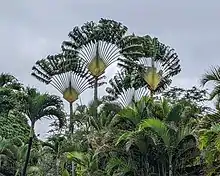 | |
| Scientific classification | |
| Kingdom: | Plantae |
| Clade: | Tracheophytes |
| Clade: | Angiosperms |
| Clade: | Monocots |
| Clade: | Commelinids |
| Order: | Zingiberales |
| Family: | Strelitziaceae |
| Genus: | Ravenala Adans. |
| Species: | R. madagascariensis |
| Binomial name | |
| Ravenala madagascariensis | |
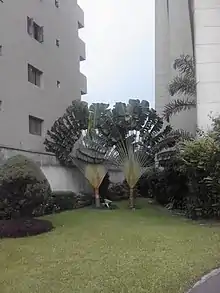
Name
It has been given the name "traveller's palm" because the sheaths of the stems hold rainwater, which supposedly could be used as an emergency drinking supply for needy travellers.[5] Another plausible reason for its name is that the fan tends to grow on an east–west line, providing a crude compass.
The scientific name Ravenala comes from Malagasy ravinala or ravina ala meaning "forest leaves".[6][7]
Description
The enormous paddle-shaped leaves are borne on long petioles, in a distinctive fan shape aligned in a single plane (distichous). The large white flowers are structurally similar to those of its relatives, the bird-of-paradise flowers Strelitzia reginae and Strelitzia nicolai, but are generally considered less attractive, with a green bract.[8] These flowers, upon being pollinated, produce brilliant blue seeds. In tropical and subtropical regions, the plant is widely cultivated for its distinctive habit and foliage. As the plant grows older, it progressively loses the lowest or oldest leaves and reveals a sturdy grey trunk. Of the four forms, varieties or subspecies, the largest is the "Bemavo", from the hills of eastern Madagascar, which can be 100 feet (30 metres) in height with a trunk 2 feet (60 cm) thick.[9] The foliar fan consists of 30 to 45 leaves for mature specimens, each as much as 36 feet (11 metres) in length.[10]
The chromosome number is 2n = 22.[11]
Range and habitat
Ravenala madagascariensis is widespread in Madagascar, including humid lowland forests, montane forests, grassland, and rocky areas, from sea level to 1,500 meters elevation.[1]
Ecology
Ruffed lemurs are a known pollinator of this plant, and given the size and structure of the inflorescences, as well as the lemur's selectivity, method of feeding, and long muzzle, this relationship is thought to have coevolved.[12]
Cultivation
The plant requires a sunny spot (not full sun until it is larger). It responds well to fertiliser, especially if it is high in nitrogen during the growing season. This produces better growth and foliage. The plant grows to an average height of 7 m (23 ft) and requires moderate water.
Gallery
 Use in urban setting at Maui, Hawaii
Use in urban setting at Maui, Hawaii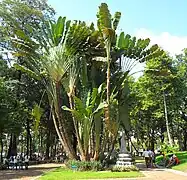 In a park of Phnom Penh, Cambodia
In a park of Phnom Penh, Cambodia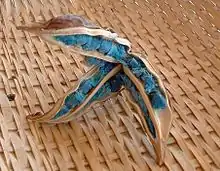 Seeds
Seeds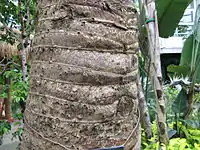 Bark
Bark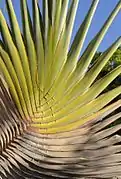 The old petioles dry out brown
The old petioles dry out brown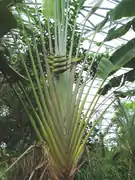 Young Ravenala
Young Ravenala
References
- Andriamanohera, A.M. 2021. Ravenala madagascariensis. The IUCN Red List of Threatened Species 2021: e.T137831330A137904098. https://dx.doi.org/10.2305/IUCN.UK.2021-1.RLTS.T137831330A137904098.en. Accessed on 07 September 2022.
- Patrick Blanc; Nelson Rabenandrianina; Annette Hladik & Claude Marcel Hladik (1999). "Les formes sympatriques et allopatriques du genre Ravenala dans les forêts et les milieux ouverts de l'est de Madagascar". Revue d'Écologie, Terre et Vie. 54 (3): 201–223. doi:10.3406/revec.1999.2292. S2CID 163071446.
- P. Blanc; A. Hladik; N. Rabenandrianina; J.S. Robert; C.M. Hladik (2003). "Strelitziaceae: The variants of Ravenala in natural and anthropogenic habitats". In Goodman, S.M.; Benstead, J. (eds.). The Natural History of Madagascar (PDF). The University of Chicago Press, Chicago & London. pp. 472–476.
- Haevermans, Thomas; Hladik, Annette; Hladik, Claude-Marcel; Razanatsoa, Jacqueline; Haevermans, Agathe; Jeannoda, Vololoniaina; Blanc, Patrick (2021-11-09). "Description of five new species of the Madagascan flagship plant genus Ravenala (Strelitziaceae)". Scientific Reports. Springer Science and Business Media LLC. 11 (1): 21965. Bibcode:2021NatSR..1121965H. doi:10.1038/s41598-021-01161-1. ISSN 2045-2322. PMC 8578647. PMID 34753985.

- McLendon, Chuck (May 16, 2000). "Ravenala madagascariensis". Floridata.com. Retrieved September 14, 2009.
- Boiteau, Pierre (1997). "reniala". Dictionnaire des noms malgaches de végétaux (in French). Vol. III. Editions Alzieu – via Malagasy Dictionary and Encyclopedia of Madagascar.
de ravina : feuille, et ala : forêt...
- Sargent, Charles Sprague (1893). "Garden and Forest: A Journal of Horticulture, Landscape Art and Forestry". 6 (282). Garden and Forest Publishing Company.
{{cite journal}}: Cite journal requires|journal=(help) - Calley, M.; Braithwaite, R. W.; Ladd, P. G. (1993). "Reproductive Biology of Ravenala madagascariensis Gmel. as an Alien Species". Biotropica. 25 (1): 61–72. doi:10.2307/2388979. JSTOR 2388979.
- Das Pflanzenreich Volume 4 Issue 45 (1900) page 29
- "Protabase Published species". Archived from the original on 2010-05-04. Retrieved 2010-04-21. Then click "Ravenala madagascariensis"
- "Full text of "Chromosome Atlas Of Flowering Plants Ed. 2nd"". Internet Archive (in Latin). 2016-10-23. Retrieved 2019-07-09.
- Garbutt, Nick (2007). Mammals of Madagascar, A Complete Guide. A&C Black Publishers. pp. 170–175. ISBN 978-0-300-12550-4.
